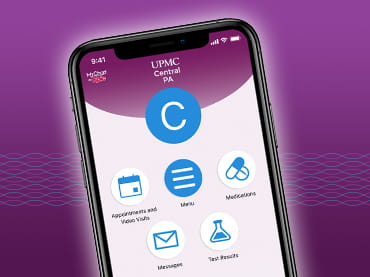Imagine if after receiving a breast cancer diagnosis, you could receive a treatment that decreases the likelihood of losing your hair? At UPMC Hillman Cancer Center, stage 1 and 2 breast cancer patients don’t have to imagine it. Our UPMC Hillman Cancer Center is the first in central Pennsylvania to offer scalp cooling at its Mechanicsburg and Harrisburg locations.
The scalp cooling treatment, also known as the “cold cap,” helps prevent hair loss before, during and even after cancer treatments.
Why do some cancer patients lose their hair?
Chemotherapy, the medications used to combat cancer, is harsh. Not only does it attack the cancer, the drugs often damage healthy cells and tissue. Because hair is the second fastest dividing cell, most patients start to see alopecia or hair loss about two weeks after chemo begins.
Chemo can affect a patient’s body in many different ways. This depends on the stage of the disease, treatment plan and the individual’s overall health status, age and pain tolerance. Cancer patients often suffer from fatigue, weight loss, loss of appetite, depression and, of course, hair loss.
Despite my patients’ positive attitude and strength, losing their hair during chemotherapy is an immediate and startling reminder that they are sick. With this innovative cold cap treatment option, they take back a little bit of control during this difficult time.
How does Scalp Cooling work?
The cold cap works by constricting or narrowing the blood vessels in the scalp. That causes a reduction of the chemotherapy reaching the hair follicle cells. The cold also decreases the division of the hair follicle cells, which contributes to less hair loss.
Research has shown that nearly half of women diagnosed with early stage breast cancer benefited from scalp cooling, losing less than half of their hair. The success of scalp cooling depends on the type of chemotherapy given and patient factors such as the thickness of the hair. Women with thick hair may not achieve the same success as those with thin hair. The added insulation of thicker hair may prevent it from cooling enough.
Studies have shown scalp cooling is safe and effective for some chemotherapy regimens. An individual’s tolerance for cold determines her comfort level. Common side effects may include chills, headaches, neck and shoulder discomfort, and scalp pain.
I encourage my patients to ask questions in order to better understand the benefits and any risks in choosing scalp cooling. While cooling treatments have been previously available, the FDA has approved this new cooling system for stage 1 and 2 breast cancer patients.
New research, technologies and advancements are in development for breast cancer treatments. We are making great strides in the fight to save lives, as well as working to minimize physical and emotional stressors.
For more information about breast cancer care at UPMC, please visit us online or call 717-545-5000.

















